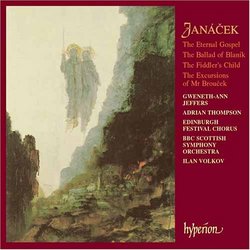| All Artists: Leos Janacek, Ilan Volkov, Glasgow BBC Scottish Symphony Orchestra, Gweneth-Ann Jeffers, Adrian Thompson Title: Janácek: The Eternal Gospel; The Ballad of Blaník; The Fiddler's Child; The Excursions of Mr. Broucek Members Wishing: 0 Total Copies: 0 Label: Hyperion UK Original Release Date: 1/1/2005 Re-Release Date: 10/11/2005 Genre: Classical Styles: Opera & Classical Vocal, Ballets & Dances, Dances, Forms & Genres, Theatrical, Incidental & Program Music, Symphonies Number of Discs: 1 SwapaCD Credits: 1 UPC: 034571175171 |
Search - Leos Janacek, Ilan Volkov, Glasgow BBC Scottish Symphony Orchestra :: Janácek: The Eternal Gospel; The Ballad of Blaník; The Fiddler's Child; The Excursions of Mr. Broucek
CD Details |
CD ReviewsRarely Heard Janacek D. A Wend | Buffalo Grove, IL USA | 11/13/2007 (5 out of 5 stars) "This disc will be of great interest to lovers of Leos Janacek's music for the rarities included. The title "Eternal Gospel is taken from Revelations but the test is taken from a comtemporary book by Czech writer Jaroslav Vrchlicky and is scored for a soprano, tenor, chorus and orchestra. The work was written in 1913 following the success of another choral worked called Amarus. The intent behind The Eternal Gospel is less intended as a religious cantata than an appeal to humanity. The score is filled with beautifully lyric music proclaiming universal Love. This recording of the cantata is nicely played and sung but for me the tenor has too much vibrato.
The Fiddler's Child dates from 1913 and was the first music composed by Janacek to be performed in England (in 1924). The music is based on a rather gruesome story. An old fiddler has died and left his child in the care of an old woman along with his fiddle. At midnight the old woman sees the ghost of the fiddler playing his old instrument for the child beckoning it to join him. The old woman scares the ghost away but in the morning she is found rocking the lifeless body of the child and the fiddle has disappeared. The music is passionate in expression with a beautiful part for the solo violin. The Excisions of Mr. Broucek is based on some popular satiric stories that Janacek set as operas (The Excursion of Mr. Broucek to the Moon and The Excursion of Mr. Broucek to the Fifteenth Century). The music for this suite was drawn from both operas and is very melodious and colorful. The Moon Waltz is spirited and a bit boisterous; Before Dawn is a quiet and contemplative movement. Song of the Hussites is a stirring patriotic piece that includes bells and organ and the final movement in the suite - Procession of the Victors - is fanfare-like somewhat reminiscent of the Sinfonietta. The Ballad of Blanik, like similar works by Smetena and Dvorak, is intended as a piece of national awakening but was not a success when it was first performed in 1920. The music begins quietly and subdued, building in drama slowly. The orchestration is for a large, including a celesta, but it does not become the rousing patriotic music as Dvorak's Hussite Overture does. This is a wonderful disc filed with, for me, unfamiliar music of Janacek that is beautifully played. If you have an interest in Czech music this is a perfect CD. " |


 Track Listings (11) - Disc #1
Track Listings (11) - Disc #1